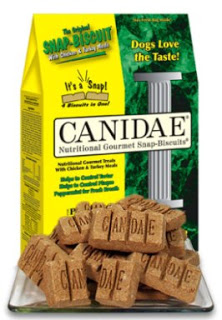Dogs

By Julia Williams
Doling out the dog treats and cat snacks is one of the more fun parts of pet ownership. It’s a ritual we all enjoy, but none more so than the pets themselves. I like giving treats to my cats because they really seem to love them, as evidenced by all the meowing, purring and leg rubbing that occurs when the treat canister comes out. They recognize this container and literally go wild when they see it. If treats make our pets so deliriously happy, there’s no harm in giving them, right? Well, not exactly. Too many treats, or the wrong kind of treats, can actually do more harm than good. Our dogs and cats can’t read labels, and they don’t know a thing about calories or what ingredients might be good for them or bad for them. Which means it’s up to us as responsible pet owners to make sure we’re “treating” them right.
Calories count!
People often joke about fat cats and pudgy pooches, but overweight pets are not funny. Excess weight can contribute to many serious health problems and can make a pet’s life miserable. To avoid over-treating your pet, ask your vet how much to feed your dog or cat each day, and include the calories from treats in their daily food allotment. A good rule of thumb is to make sure that no more than 10 to 20% of the day’s calories are coming from treats. Be aware that some treats have significantly more calories than others, so read the nutrition labels and choose your treats wisely.
Quality counts too!

Pet treats vary a great deal in terms of the nutrition and health benefits they provide. Some treats are as nutritionally devoid and bad for pets as a greasy bag of chips is for us. They contain little in the way of healthy ingredients and may also contain unhealthy things like by-products, chemical preservatives and fillers. Other pet treats, like the CANIDAE Snap-Bits™ and Snap-Biscuit® dog treats, are made with premium quality ingredients and other things that actually benefit the pet. Such as: viable micro-organisms for GI tract health and good digestion, balanced omega 6 & 3 fatty acids, essential vitamins and minerals, skin and coat conditioners and natural preservatives. These nutritionally complete treats are low in calories and fat, and high in protein. I don’t mean to sound like a commercial for CANIDAE here, but honestly, I consider these to be the crème de la crème of dog treats.
Don’t give treats for begging
Dogs and cats are incredibly smart creatures. It doesn’t take long for them to figure out that they can use those “sad puppy dog eyes” and feline wiles to manipulate their owners into giving them a treat. It can be hard to resist those plaintive looks or insistent meows, but resist you should. Giving in to their begging is rewarding them for inappropriate behavior, and once you do, they’ll never stop begging. I made this mistake with my cats. I started giving them each a handful of crunchies before I went to bed. Now, every single night without fail, as I am getting ready for bed there is loud, insistent meowing and pacing going on in the kitchen. I am 100% certain this begging is not from a place of “We’re starving here, give us some food already!” Nevertheless, it can be awfully hard to resist, and I hate that I created a situation where they expect – no, demand – these treats every night.
Use treats as a reward
During and after playtime is a perfect time to offer your cat or dog treats. This helps them to associate positive things with exercise, and they’ll look forward to this daily activity even more than they already do. Treats are also great to use for training sessions and teaching your dog or cat tricks (don’t laugh – cats can be taught to perform tricks!). Just remember to adjust the amount of their regular food to avoid overfeeding.
Giving treats is a pleasure, and it builds upon that amazing human/animal bond we have with our beloved pets. When we “treat” them right, they give us many years of love and companionship in return.
Read more articles by Julia Williams
- How To Succeed At Treat Training With Your Dog
By Tamara McRill Have you been trying to positively reinforce good behavior in your dog by treat training, but it just isn't working? The problem could be in your technique. Simply giving your pet a bit of food without these best practices could...
- How To Help Your Dog Or Cat Lose Weight
By Linda Cole An overweight dog or cat can struggle with many of the same health concerns overweight people have to deal with. There's nothing wrong with giving your pet a few TidNips treats now and then, especially when training, but we need to...
- “just Say No” To Your Pet, Because You Love Them
By Julia Williams Just as parents often have to say no to their children when they want things that aren’t good for them, so too do responsible pet owners. Children and pets are not always able to discern danger or consequences, and it’s our job...
- Are Treats The Cat’s Meow? Or A Dog’s Delight?
By Julia Williams Does your pet go bonkers for treats? When the treats come out, do they immediately transform into half-starved wild beasts that practically maul you to get at the goods? Does the sight of the treats make them act like their last meal...
- I Found The Perfect Dog Biscuits!
By Ruthie Bently Finding a healthy biscuit that your dog loves can be hard to do, not because there is a lack of dog biscuits on the market, but I have to be calorie conscious as Skye’s caregiver. Those of us who live with dogs that need to lose weight...
Dogs
The Right Way to “Treat” Pets

By Julia Williams
Doling out the dog treats and cat snacks is one of the more fun parts of pet ownership. It’s a ritual we all enjoy, but none more so than the pets themselves. I like giving treats to my cats because they really seem to love them, as evidenced by all the meowing, purring and leg rubbing that occurs when the treat canister comes out. They recognize this container and literally go wild when they see it. If treats make our pets so deliriously happy, there’s no harm in giving them, right? Well, not exactly. Too many treats, or the wrong kind of treats, can actually do more harm than good. Our dogs and cats can’t read labels, and they don’t know a thing about calories or what ingredients might be good for them or bad for them. Which means it’s up to us as responsible pet owners to make sure we’re “treating” them right.
Calories count!
People often joke about fat cats and pudgy pooches, but overweight pets are not funny. Excess weight can contribute to many serious health problems and can make a pet’s life miserable. To avoid over-treating your pet, ask your vet how much to feed your dog or cat each day, and include the calories from treats in their daily food allotment. A good rule of thumb is to make sure that no more than 10 to 20% of the day’s calories are coming from treats. Be aware that some treats have significantly more calories than others, so read the nutrition labels and choose your treats wisely.
Quality counts too!

Pet treats vary a great deal in terms of the nutrition and health benefits they provide. Some treats are as nutritionally devoid and bad for pets as a greasy bag of chips is for us. They contain little in the way of healthy ingredients and may also contain unhealthy things like by-products, chemical preservatives and fillers. Other pet treats, like the CANIDAE Snap-Bits™ and Snap-Biscuit® dog treats, are made with premium quality ingredients and other things that actually benefit the pet. Such as: viable micro-organisms for GI tract health and good digestion, balanced omega 6 & 3 fatty acids, essential vitamins and minerals, skin and coat conditioners and natural preservatives. These nutritionally complete treats are low in calories and fat, and high in protein. I don’t mean to sound like a commercial for CANIDAE here, but honestly, I consider these to be the crème de la crème of dog treats.
Don’t give treats for begging
Dogs and cats are incredibly smart creatures. It doesn’t take long for them to figure out that they can use those “sad puppy dog eyes” and feline wiles to manipulate their owners into giving them a treat. It can be hard to resist those plaintive looks or insistent meows, but resist you should. Giving in to their begging is rewarding them for inappropriate behavior, and once you do, they’ll never stop begging. I made this mistake with my cats. I started giving them each a handful of crunchies before I went to bed. Now, every single night without fail, as I am getting ready for bed there is loud, insistent meowing and pacing going on in the kitchen. I am 100% certain this begging is not from a place of “We’re starving here, give us some food already!” Nevertheless, it can be awfully hard to resist, and I hate that I created a situation where they expect – no, demand – these treats every night.
Use treats as a reward
During and after playtime is a perfect time to offer your cat or dog treats. This helps them to associate positive things with exercise, and they’ll look forward to this daily activity even more than they already do. Treats are also great to use for training sessions and teaching your dog or cat tricks (don’t laugh – cats can be taught to perform tricks!). Just remember to adjust the amount of their regular food to avoid overfeeding.
Giving treats is a pleasure, and it builds upon that amazing human/animal bond we have with our beloved pets. When we “treat” them right, they give us many years of love and companionship in return.
Read more articles by Julia Williams
- How To Succeed At Treat Training With Your Dog
By Tamara McRill Have you been trying to positively reinforce good behavior in your dog by treat training, but it just isn't working? The problem could be in your technique. Simply giving your pet a bit of food without these best practices could...
- How To Help Your Dog Or Cat Lose Weight
By Linda Cole An overweight dog or cat can struggle with many of the same health concerns overweight people have to deal with. There's nothing wrong with giving your pet a few TidNips treats now and then, especially when training, but we need to...
- “just Say No” To Your Pet, Because You Love Them
By Julia Williams Just as parents often have to say no to their children when they want things that aren’t good for them, so too do responsible pet owners. Children and pets are not always able to discern danger or consequences, and it’s our job...
- Are Treats The Cat’s Meow? Or A Dog’s Delight?
By Julia Williams Does your pet go bonkers for treats? When the treats come out, do they immediately transform into half-starved wild beasts that practically maul you to get at the goods? Does the sight of the treats make them act like their last meal...
- I Found The Perfect Dog Biscuits!
By Ruthie Bently Finding a healthy biscuit that your dog loves can be hard to do, not because there is a lack of dog biscuits on the market, but I have to be calorie conscious as Skye’s caregiver. Those of us who live with dogs that need to lose weight...
